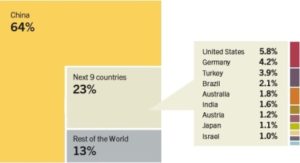India: Australian Grant for Developing a Solar Thermal Cooling System
December 25, 2009Deepak Gupta India
 The recently held workshop on solar cooling technology in India was a great success: Instead of a target audience of 30 to 40, almost 100 people joined the workshop in Delhi this October. The picture above shows Deepak Gupta, Secretary for the Ministry of New and Renewable Energy (right), while speaking at the inauguration session.
The recently held workshop on solar cooling technology in India was a great success: Instead of a target audience of 30 to 40, almost 100 people joined the workshop in Delhi this October. The picture above shows Deepak Gupta, Secretary for the Ministry of New and Renewable Energy (right), while speaking at the inauguration session.
Photo: TERI
Cooling consumes between 20 and 25 % of the electricity produced in India since several regions struggle with high temperatures all year round . Therefore, The Energy and Resource Institute (TERI) initiated the research project “Solar cooling for urban and remote rural applications”. This project, a cooperation with the Commonwealth Scientific and Industrial Research Organization (CSIRO), is dedicated to the development of a solar-biomass hybrid cooling, a decentralized system used for both cold storage and power generation in rural areas. A biomass-based generator will supply backup heat to the solar cooling system and bridge interruptions in energy supply by the solar heat source. The duration of the project is 30 months. It started in April of 2009.
Exactly this programme will now receive the support of the Australian government. At the middle of November, the Prime Minister of Australia, Kevin Michael Rudd, announced an AusAID grant of AUD 1 million to support two TERI programmes, according to a TERI press release. Among these two is the solar cooling project.
Together with the Ministry of New and Renewable Energy, TERI organised a workshop in New Delhi this October as part of the solar cooling project. Participants of the workshop discussed how an effective promotion of solar cooling applications in India should look like. These discussions encompassed a wide range of application areas – comfort cooling, vaccine refrigeration, storing fruits and vegetables. Almost all of the parties involved were well-represented at the event – be it academic scholars, research organizations, consultants, product developers, funding organizations and government offices. Six companies came forward to present case studies of solar cooling projects (see attached programme). The workshop finally concluded with emphasizing the need for a stronger policy support for solar cooling in India.
More information:
http://www.teriin.org
http://www.csiro.au/


